BEST RECORDINGS OF THE MONTH: Opera: Bartok's Bluebeard's Castle Vocal: Joan Baez's "Gulf Winds" and Frederica von Stade's French-aria recital Instrumental: the Tokyo Quartet in Haydn's Op. 50 and the ELO in "A New World Record" Jazz: Bucky Pizzarelli and Bud Freeman.
------ STEREO REVIEW'S SELECTION OF RECORDINGS OF SPECIAL MERIT -----
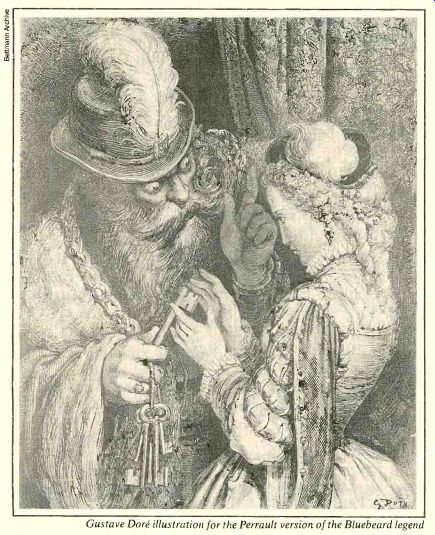
----- Gustave Dore illustration for the Perrault version of the Blueheard
legend.
"At Once Fascinating and Unbearable": Bartok's Intense, Inward, Extraordinarily Coloristic Opera Bluebeard's Castle.
BLUEBEARD'S CASTLE, written in 1911, is Bartok's only opera and, indeed, it barely qualifies for admission into that exalted and much-abused genre. It is a one-act work with only two characters and almost no action at all. Judith, Bluebeard's latest, comes into his castle and immediately demands to know what lies behind seven mysterious doors. She finds a torture chamber, an armory, a hoard of treasure, a secret garden, and a window on her spouse's realm, all stained with blood. Finally she discovers a lake of tears and Bluebeard's previous wives, alive and covered with jewels--a fate worse than death that Judith, for her curiosity, must now share.
What does it all mean? Are the seven doors seven chambers in the human mind? Something like that, no doubt. Bluebeard's Castle belongs to that small and remarkable group of psychological and expressionist works created (mostly) before World War I (Schoenberg's Pierrot Lunaire and Erwartung are others). For it, Bartok wrote a score that stands out in his work as in tense, inward, and extraordinarily coloristic (most of Bartok's music is distinguished by rhythm and drive, but these are unimportant here, as is the use of folklore, which plays only a secondary role). The scenes are like a series of brushstrokes interpreting inner states, and they are connected by the somber mood of the whole. It is an agonizingly beautiful work, at once fascinating and unbearable.
Bluebeard's Castle is not unknown in the opera house, and it has been re corded several times in several languages, including the original Hungarian. But it has probably never had the all-round advantages of superb singing, original language, orchestral workman ship, superb conducting, expressive shape, and first-class sound it gets in its new recording by Columbia. How odd that this striking performance of a Hungarian opera in Hungarian should be produced by a Greek-American soprano, a German baritone, a French conductor, an English orchestra, and an American record company! I cannot vouch for the quality of the Hungarian sung here, but I will vouch without reservation for all the rest of it.
-Eric Salzman
BARTOK: Bluebeard's Castle. Tatiana Troyanos (soprano), Judith; Siegmund Nimsgern (baritone), Bluebeard; BBC Symphony Orchestra, Pierre Boulez cond. CoLUMBIA M 34217 $6.98.
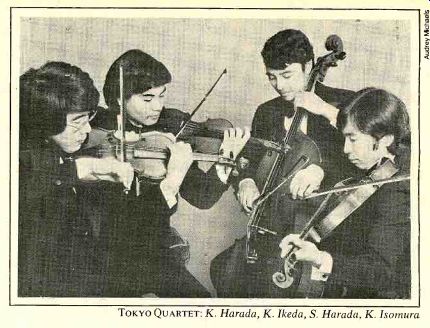
--- TOKYO QUARTET: K. Harada. K. Ikeda, S. Harada, K. Isomura.
Joan Baez: A Little Company To Help Us Through The Seventies
As I watched the recent Dylan TV debacle, suffering along with the drenched and (it seemed to me) excessively be-hatted audience, it came across strongly, unmistakably, that the real star of the show was the beautiful Joan Baez and not the baleful, posturing Dylan. That she has survived the Sixties and her initial fame (and/or political notoriety) and is now, in the Seventies, more of a performer, more of an interpretive singer, and more of a beauty than ever is testament to a talent that has deepened, broadened, and matured as the years have passed. While Dylan stood there uneasily, looking like a tempest-tossed Goodwill poster, snarling out his lyrics as if the Feds of the corrupt Sixties were still breathing down his bandannaed neck, Baez, dressed in a sort of outrageous bur noose appropriate perhaps to a furloughed Carpathian archduchess, capered around the stage having, most of the time, an absolutely joyous ball.
And that, dear friends, is precisely what you will have too if you listen to her new A&M release "Gulf Winds." She's back in very secure stride as a composer (she wrote all the songs), and though none of her efforts will exactly knock you down with their originality or depth of insight, they are perfect material for her. The title song, Gulf Winds, the story of a young girl in a Mexican family living in the U.S., I found especially good. She sings it to her own guitar accompaniment, and it has all of the quiet, angry power of her best work in the past. Other highlights are 0 Brother!, a snappish, funny tale about a no-good who's going to get his someday if Baez has anything to say about it, and Stephanie's Room, a dramatic mood piece with a touch of odd ambivalence about it that the performance very carefully does nothing to clarify. Her voice seems to be in as good shape as ever-still the shimmering, satiny soprano web that has en chanted me with its tonal iridescence ever since I first heard it years ago.
But the most important thing is that Baez seems to be totally out of her activist bag … concerned, and this new album (her best-produced, by the way, since she left Vanguard) is a happy hymn to Happiness Now Yeah, we're all gonna live through the Seventies too, and company like this will make it easier.
-Peter Reilly
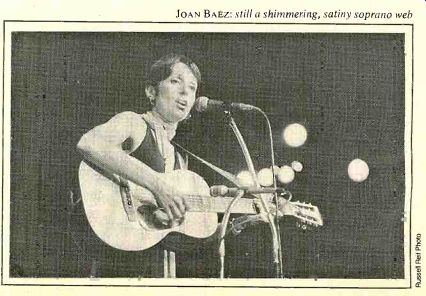
-------- JOAN BAEZ: still a shimmering, satiny soprano web
JOAN BAEZ: Gulf Winds. Joan Baez (vocals and guitar); orchestra. Sweeter for Me; Seabirds; Caruso; Still Waters at Night; Kingdom of Childhood; O Brother!; Time Is Passing Ur. By; Stephanie's Room; Gulf Winds. A&M SP-4603 $6.98, 4603 $7.98, 4603 57.98.
The Tokyo Quartet Returns with the Rest of Haydn's Opus 50 Now just where would you go about looking for an authentic interpretation of the wit and wisdom of an elderly eighteenth-century Austrian musical philosophe named Josef Haydn these days? Tokyo, perhaps? Well, why not? That's where Deutsche Grammophon looked, and they evidently looked in the right place. The Tokyo Quartet received a 1974 STEREO REVIEW Record of the Year award for an album containing the first two quartets of Haydn's Op. 50, and DG recently sent the group back into the studio to do the rest of them (there are six in all) and has just issued the whole thing in a three-disc set.
Opus 50 is a fine set of quartets writ ten in 1787 and dedicated to the King of Prussia, a good cellist and an avid quartet player. These works are situated on that steep slope that leads to the apex of Haydn's career as a quartet composer. Our hero was a very great symphonist, but he was perhaps an even greater master of the string quartet, a medium he himself brought to perfection (he is challenged in this field, but not really surpassed, only by Beethoven). Al though these quartets are not, on the whole, as well known as some of the later ones, they are full of the choicest expressions of Haydn's wit and invention. Since the King of Prussia was a cellist, Haydn starts right out in No. 1 with a cello solo-on one note! Nothing to tax the royal talent, you know, but don't think this royal Johann One-Note has been relegated to a mere accompaniment role. The entire movement is built on this one-note theme of repeated B-flats and the little cadential figure in the violins above it. Indeed, all the instruments have a wonderful freedom in these quartets; even the second violin gets a nice solo in the slow movement of No. 2. In No. 3 there is one of Haydn's finest false endings, while No. 2 has a kind of false opening-it starts out in the "wrong" spot and bounces all over the place with consummate ease and clarity. The F-sharp Minor Quartet, No. 4, has a fugal finale, the masterpiece of its kind (often imitated, but never quite equaled-again, even by Beethoven).
The Tokyo String Quartet, founded in 1969, does not in truth come to us (or to DG) straight from Japan but via New York's Juilliard School (where they studied with the Juilliard Quartet).
They are also products of the Toho School in Tokyo, and their international fame is owing in large part to a sensational debut in a Munich competition where they took first prize. A recording contract with DG followed. This is a crack ensemble; they play with precision and virtuosity, of course, but also with delicacy, finesse, spirit, and in sight. They have developed a wonderful Classical style of their own, balanced and elegant but not the least bit lacking in wit, fire, and expression. This is Haydn-via Tokyo or what ever-as he ought to be.
-Eric Salzman
HAYDN: String Quartets, Op. 50, Nos. 1-6 (Hob. HI, Nos. 44-49, "Prussian"). Tokyo Quartet. DEUTSCHE GRAMMOPHON 2709 060 three discs $23.94.
Making Sophisticated Stereo Equipment Worthwhile: ELO's Anthology of Rock Sound
Rock wouldn't be in much trouble if a few more bands did their jobs as well as the Electric Light Orchestra does its job, a description of which is most likely on file in the great personnel office in the sky under the heading of Sound Enrichment. The ELO has quite a sense of history where sound is concerned, and in its work you hear echoes of the Beatles, the Moody Blues, the doo-wop groups, and Beethoven. Also Dylan, Chuck Berry, Little Richard, and so on.
The United Artists album "A New World Record" has these elements cross-indexed in a glorious sound one can still with a straight face call rock.
Among other things, it makes sophisticated stereo equipment worth having-which most rock records don't do-as it sends out knee-bending (fake classical) orchestral bass and a swirl of stuff that's actually warm and musical though it comes from electronic instruments. Jeff Lynne's taste in arranging is warmer (hell, it's schlockier) than, but on a plane even with, Steeleye Span's. He looks for other ways to do things, and he has found a fair number.
The lyrics here do their job, too, which is to turn up a little something now and then but generally to avoid kicking up too much fuss about it. The emphasis is on the sound of music and not on the fury of it. It isn't a complete "record" of how the "new world" really is, but a welcome affirmation of the suspicion that there's still some good stuff left in it.
-Noel Coppage
ELECTRIC LIGHT ORCHESTRA: A New World Record. Electric Light Orchestra (vo cals and instrumentals); orchestra, Jeff Lynne, Richard Tandy, Louis Clark, arrs. Tightrope; Telephone Line; Rockaria!; Mis sion (A World Record); So Fine; Livin' Thing; Above the Clouds; Do Ya; Shangri La. UNITED ARTISTS UA-LA679-G $6.98, UA-EA679-H $7.98, UA-CA679-H $7.98.
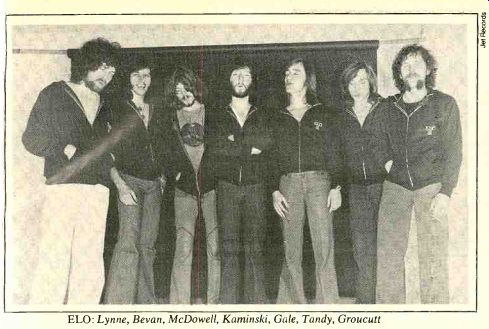
--------- ELO: Lynne, Bevan, McDowell, Kaminski, Gale, Tandy, Groucutt.
A Solo Recital Debut: French Opera Arias by Frederica von Stade
WITHIN a few years and with relatively few appearances on concert-hall and opera stages around the world (New York, San Francisco, Par is, Glyndebourne, Salzburg) in a fairly limited repertoire, Frederica von Stade has risen from her auspicious professional beginnings as a Metropolitan Op era audition winner to her present status as an international star. Her good looks and winning stage presence in part account for this phenomenal growth, but the main reason can be found on her new debut recital disc of French opera arias for Columbia (it follows one she shared with another charmer, soprano Judith Blegen, on Columbia M-33307).
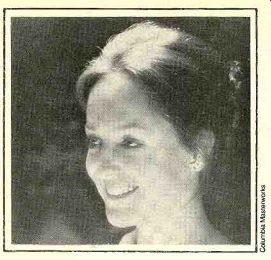
------- FREDERICA VON STADE: a phenomenal ascent to international
stardom
This release reminds me of the time more than fifteen years ago when I was reviewing the first recordings of Teresa Berganza in these pages, for here again we are in the presence of an attractive young singer who is already a mature artist, blessed with innate musicianship and sensitivity as well as an undeniable flair. Miss Von Stade's voice is a bright mezzo, fresh and lovely in tone quality, at the moment stronger in the upper ex tension, where it ascends to a high C with relative ease. With her clear and pointed diction she reveals a natural affinity for the French repertoire, interpreting all the music on this disc to virtual perfection. The courtly playfulness of the page Urbain, the longing Mignon, the dejection of Marguerite are as capably, as persuasively rendered as are the two delicious Offenbach vignettes. Even the somewhat un dramatic excerpt from Beatrice et Benedict comes across with fine shadings and expressivity.
The artist--and producer Paul Myers--deserves special praise for assembling a refreshingly imaginative pro gram. I find conductor John Pritchard's pacing a shade too leisurely at times, but the orchestral playing is beautiful and it is reproduced in ideally balanced rich sound.
-George Jellinek
FREDERICA VON STADE: French Opera Arias. Meyerbeer: Les Huguenots: Nobles seigneurs, salut! Gounod: Romeo et Juliette: Depuis hier je cherche en vain. Berlioz: Bea trice et Benedict: Il m'en souvient. La Dam nation de Faust: D'amour l'ardente flamme.
Massenet: Wert her: Va, laisse couler mes larmes. Cendrillon: Enfin, je suis ici. Thomas: Mignon: Connais-tu le pays?
Offenbach: La Perichole: Ah! quel diner. La Grande Du chesse de Gerolstein: Dites-lui. Frederica von Stade (mezzo-soprano); London Phil harmonic Orchestra, John Pritchard cond. COLUMBIA M 34206 $6.98.
Pizzarelli/Freeman: Jazz as Satisfying and Comforting as Fine Old Brandy
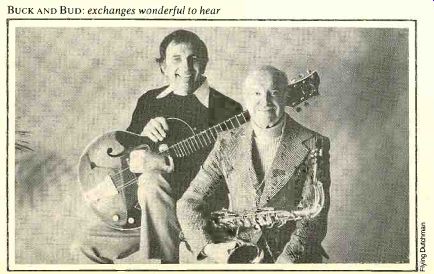
----- Buck and BUD: exchanges wonderful to hear.
FLYING DUTCHMAN'S teaming of guitarist Bucky Pizzarelli and ten or saxophonist Bud Freeman turns out to be a happy event. Freeman, a member of the "Austin High Gang" of the slugging Chicago school of white jazz in the Twenties, is now near seventy, but his fire and bite remain undiminished, his jazz is still muscular and generous. Pizzarelli is the present wearer of the crown in the royal line of jazz guitarists that began with Eddie Lang-a Freeman contemporary-and is traceable in the glorious careers of Carl Kress, Dick McDonough, Charlie Christian, Al Casey, Django Reinhardt, and other princes of the fretboard.
It is interesting to note that with all the often loony and self-destructive changes jazz has been through since 1940, the guitarists seem to have been able more than most to maintain their sanity amidst the chaos. Elder states man Pizzarelli, for example, still has the taste, the gentle but firm execution, the agile and lyrical solo ideas, and the real joy in playing he has always had. Maybe it comes with the instrument.
Saxophonist Freeman now lives in Ireland and works as much as he pleases throughout Europe; this album was recorded during a recent visit to America. I used to admire the solidity of his tone, but it now seems to me somewhat fuzzy and spitty. His musical thinking is still athletic, however, with just the right balance between common sense and whoop-te-doo.
Most of the selections on this "Buck & Bud" album are duets between the two instrumentalists, and the ex changes of experience, personality, imagination, sympathy, and sheer "clout" are wonderful to hear. The material is, of course, superb, drawn as it is from the hefty catalog of inspired, strongly built melodies devised in the decades between 1920 and 1940 when the consistent high quality of the American popular song set the standard for the world.
Veteran bassist Bob Haggart (it's good to hear him again), drummer Ronnie Traxler, and pianist Hank Jones provide smooth and neat support on the quintet selections. The album is as satisfying and comforting as a fine old brandy, and because of the talents of the people involved, the record is not only rewarding today but will remain so for (a conservative estimate) about the next hundred years.
-Joel Vance
BUCKY PIZZARELLI and BUD FREEMAN: Buck & Bud. Bucky Pizzarelli (guitar); Bud Freeman (tenor saxophone); Hank Jones (piano); Bob Haggart (bass); Ronnie Traxler (drums). Way Down Yonder in New Orleans; Easy to Love; Tea for Two; Sweet Sue, Just You; Blues for Tenor; At Sun down; I Could Write a Book; You Took Advantage of Me; Exactly Like You; Dinah; Just One of Those Things. FLYING DUTCHMAN BDL1-1378 $6.98, BDS1-1378 $7.98, BDKI-1378 $7.98.
Also see:
INSTALLATION OF THE MONTH, RICHARD SARBIN
BEST RECORDINGS OF THE MONTH: Opera: Bartok's Bluebeard's Castle Vocal: Joan Baez's "Gulf Winds" and Frederica von Stade's French-aria recital Instrumental: the Tokyo Quartet in Haydn's Op. 50 and the ELO in "A New World Record" Jazz: Bucky Pizzarelli and Bud Freeman
Link | --FIEDLER OF BOSTON: A profile of the builder of America's musical bridges, by IRVING KOLODIN
Source: Stereo Review (USA magazine)